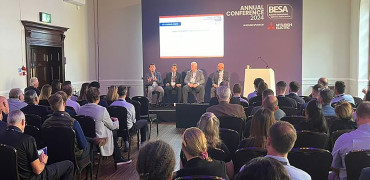Having been a sales engineer graduate with Mitsubishi Electric for just over a year now, Faith Mwithimbu has been assessing what sustainability means to the corporation, and how that translates into what it offers the UK.
I had the pleasure of attending the BESA Conference this year, which was an incredibly insightful experience, and helped to shed light on the current trends and challenges in our industry, while also sparking exciting conversations about where we’re headed in the future.
It got me thinking about a recent report I’d prepared as part of my first year as a graduate on how the company I am now working for, deals with its own sustainability goals
I wanted to show the advantages of sustainability for businesses and examine obstacles
An urgent need
Climate change is increasingly recognised as a significant global challenge affecting governments, communities, and businesses alike.
This urgency has catalysed a move towards sustainability and the implementation of net-zero strategies.
The rising occurrence of extreme weather events, including forest fires, floods, and unexpected snowfall in atypical regions, underscores the undeniable impact of climate change.
In response, numerous businesses are pledging to achieve net zero emissions to support global mitigation efforts and transition into a low-carbon economy.
By setting net zero targets, companies not only lessen their environmental impact but also boost their resilience, competitiveness, and reputation in a market that is progressively valuing eco-consciousness.
In my report I wanted to delve into the advantages of sustainability for businesses, such as increased resilience, competitiveness, and enhanced reputation, while also examining the obstacles they encounter in adapting to new environmental standards and expectations.
Focusing on Mitsubishi Electric, I wanted to investigate how the company manages the complexities involved in transitioning to a more sustainable and low-carbon future.
As the tangible effects of climate change become more pronounced, businesses around the globe are acknowledging the imperative to adopt sustainable practices and commit to net zero emissions strategies.
Sustainability has transitioned from being a voluntary effort to a critical strategic necessity, driven by consumer preferences, regulatory requirements, and the economic advantages of lowering resource use and enhancing resilience.
However, embracing sustainable practices is not without its challenges. It demands significant investments in new technologies, a revaluation of supply chains, and the ability to navigate intricate regulatory environments.
What sustainability means to ME
For Mitsubishi Electric (ME), sustainability is deeply ingrained in the company’s long-term vision rather than being a mere reaction to external pressures.
Central to this vision is the "Environmental Vision 2050," which outlines ambitious goals to cut carbon emissions, reduce resource consumption, and promote a circular economy (Mitsubishi Electric Corporation, 2019).
This commitment involves integrating environmental responsibility into every facet of the company’s operations, including product development, manufacturing processes, and supply chain management.
Mitsubishi Electric strives to achieve net-zero carbon emissions across its entire value chain by harnessing innovative technologies. These include energy-efficient solutions in heating, ventilation, and air conditioning (HVAC) systems, renewable energy technologies like photovoltaic systems, and the development of smart city infrastructure.
By prioritising energy efficiency and resource optimisation, the company aims to not only decrease its own environmental impact but also assist customers and industries in reducing theirs.
Moreover, Mitsubishi Electric is aware of the increasing consumer and regulatory demand for sustainable products. To stay competitive and meet these evolving expectations, the company invests significantly in research and development of eco-friendly technologies, ensuring that sustainability is a core element of its product design and lifecycle.
Beyond environmental initiatives, Mitsubishi Electric adopts a holistic approach to sustainability, addressing social responsibility and governance as fundamental components of its corporate strategy.
This includes efforts related to human rights, diversity, and community engagement, thereby reinforcing its position as a responsible corporate citizen. In essence, sustainability for Mitsubishi Electric represents a comprehensive dedication to fostering a low-carbon, resource-efficient, and socially responsible future.
The benefits of sustainability
Mitsubishi Electric’s dedication to sustainability brings multiple benefits to both the company and the environment. By implementing sustainable practices, Mitsubishi Electric enhances its brand reputation, boosts operational efficiency, and ensures long-term business sustainability in a world that increasingly values environmental responsibility.
A primary advantage is the reduction in energy consumption and operational costs achieved through eco-friendly technologies. For example, the company’s HVAC systems, such as Variable Refrigerant Flow (VRF) units, utilise refrigerants with low global warming potential (GWP) like R290, R32 which significantly lowers greenhouse gas emissions while maintaining energy efficiency.
This approach not only aligns with global sustainability goals but also enhances Mitsubishi Electric’s competitiveness as consumers and regulators increasing low-carbon solutions.
Additionally, Mitsubishi Electric’s focus on resource optimisation leads to both environmental and economic gains. The development of inverter-driven air conditioning systems, which adjust compressor speeds based on real-time cooling or heating demands, results in substantial energy savings compared to traditional fixed-speed systems. These systems ensure that energy is used efficiently, preventing overcooling or overheating, thereby lowering power consumption and improving overall system efficiency.
Similarly, the Lossnay mechanical ventilation with heat recovery (MVHR) systems recycle energy from outgoing air to preheat or precool incoming air, significantly reducing the energy needed to maintain comfortable indoor temperatures in commercial settings.
By integrating these advanced technologies into its product offerings, Mitsubishi Electric not only diminishes its own environmental footprint but also supports customers in meeting stringent regulatory requirements regarding energy efficiency and emissions.
This dual focus on innovation and sustainability reinforces Mitsubishi Electric’s leadership in the transition toward a low-carbon economy, benefiting both the environment and the company’s market position.
Innovation
Mitsubishi Electric has consistently demonstrated a commitment to innovation in sustainability, notably with the development of the first Hybrid Variable Refrigerant Flow (HVRF) system in the UK. This groundbreaking technology integrates the energy efficiency of a traditional VRF system with the environmentally-friendly characteristics of water-based heating and cooling.
By eliminating the need for refrigerants within occupied spaces, the HVRF system not only reduces the risk of refrigerant leakage but also enhances energy efficiency and provides a more eco-conscious solution for climate control in commercial buildings.
Mitsubishi Electric’s forward-thinking approach led to the company securing a patent for the HVRF system, underscoring its leadership in sustainable technology and reinforcing its mission to create innovative solutions that contribute to a low-carbon future.
This achievement also highlights Mitsubishi Electric's competitive edge in the HVAC market, where it faces strong competition from companies like Daikin, Samsung, and Panasonic. While these competitors also offer advanced climate control solutions, Mitsubishi Electric's ability to pioneer the Hybrid VRF technology showcases its commitment to going above and beyond in both sustainability and innovation.
By focusing on reducing the environmental impact of its products while maintaining top-tier performance, the company ensures it remains a leader in an increasingly eco-conscious marketplace.
How do you balance business growth with the need to reduce your environmental impact?
Sustainable challenges
Despite its significant progress, Mitsubishi Electric has encountered several challenges in its pursuit of sustainability. One major obstacle is balancing business growth with the need to reduce environmental impact.
As a leader in energy-intensive industries, Mitsubishi Electric operates in sectors that inherently produce substantial carbon emissions and environmental waste.
Transitioning to more energy-efficient and renewable energy sources while continuing to meet global demand necessitates considerable investments in research and development, as well as the upgrading of existing manufacturing processes and facilities.
Achieving this balance without compromising profitability or market competitiveness is a persistent challenge for the company.
In summary
Mitsubishi Electric is making significant strides toward sustainability despite the challenges it faces as a large multinational corporation.
Through its Environmental Vision 2050, the company has committed to reducing carbon emissions and promoting environmental responsibility across its entire value chain.
By developing innovative technologies, such as energy-efficient HVAC systems and low-global-warming refrigerants, Mitsubishi Electric demonstrates leadership in the transition to a low-carbon economy.
These efforts have strengthened the company’s competitiveness while enhancing its reputation as a socially responsible business.
While there are challenges, such as balancing growth with environmental goals and aligning the global supply chain with sustainability standards, Mitsubishi Electric continues to invest in research, development, and corporate programs that drive its sustainability agenda forward.
I’m proud to work for a company that not only pushes innovation but is genuinely committed to making the world a better place through sustainability efforts.
Faith Mwithimbu, Sales Engineer




